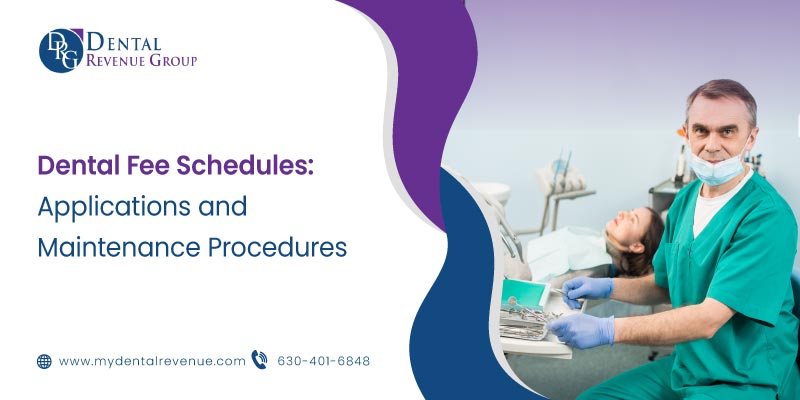Dental fee schedules play a crucial role in the financial management and overall success of dental practices. In an industry where costs are constantly evolving, maintaining an accurate and up-to-date fee schedule is essential for ensuring fair pricing, profitability, and patient satisfaction. This blog delves into the applications and maintenance procedures of dental fee schedules, providing insights into their importance, and challenges faced by dental practices.
Importance of Dental Fee Schedules in Dental Practices
Dental fee schedules play a crucial role in the smooth operation of dental practices. By setting clear and consistent prices, dental fee schedules eliminate ambiguity and confusion for both the dental team and the patients. Dentists and their staff can confidently communicate the costs of treatments, making it easier for patients to understand and plan for their dental expenses.
Furthermore, dental fee schedules provide a foundation for financial stability and profitability within a practice. This allows dental practices to thrive and provide high-quality care to their patients. These schedules outline the costs associated with different treatments and services, providing a standardized pricing structure within the practice. The purpose of dental fee schedules is to ensure consistency and transparency in pricing, both for the dental team and the patients.
Benefits Of Dental Fee Schedules
Here are the following benefits of dental fee schedules to ensure accuracy and transparency.
Ensuring Fair Pricing and Transparency
One of the primary benefits of dental fee schedules is that they promote fair pricing and transparency. By establishing predetermined fees for procedures, patients can trust that they are being charged appropriately, without the risk of arbitrary or inconsistent pricing. This transparency helps build trust between the dental practice and its patients, fostering a positive and long-term relationship.
Enhancing Financial Stability and Profitability
Dental fee schedules contribute to the financial stability and profitability of dental practices. Dentists can set fees that cover their expenses while generating a reasonable profit. This ensures that the practice can continue to provide quality care and invest in advanced technologies and training for its dental team.
Facilitating Patient Communication and Satisfaction
Clarity in pricing plays a vital role in patient satisfaction. Dental fee schedules allow the dental team to communicate treatment costs effectively, empowering patients to make informed decisions about their oral health. By eliminating surprises and uncertainties regarding pricing, patients feel more comfortable and confident in moving forward with necessary treatments. This ultimately leads to higher patient satisfaction and loyalty to the practice.
Key Components of Dental Fee Schedules
Procedure Codes and Descriptions
Procedure codes and descriptions form a critical part of dental fee schedules. These codes serve as a standardized language across the dental industry, allowing for consistency in pricing and billing. Each code represents a specific treatment or service, and the fee schedule should include a detailed description of what is covered under each code.
Fee Determination Factors
Various factors influence the determination of fees within dental fee schedules. These factors may include the complexity of the procedure, the time and effort required, the cost of materials and equipment, and the level of expertise needed. Dentists must consider these factors when setting fees to ensure they accurately reflect the value and resources involved in delivering quality care.
Insurance Reimbursement Considerations
In dental fee schedules, it is crucial to consider insurance reimbursement rates. Some dental practices work with insurance companies, and fees should align with the reimbursement rates established by these insurance providers. Dentists need to analyze these rates and determine if adjustments need to be made to their fee schedules to maintain a fair and sustainable financial relationship with insurance companies.
Best Practices and Considerations For Developing a Dental Fee Schedule
Analyzing Practice Overhead and Costs
When developing a dental fee schedule, dentists must first analyze their practice’s overhead and costs. This includes evaluating expenses such as rent, utilities, salaries, supplies, and equipment. By understanding these costs, dentists can ensure that their fees cover the necessary expenses while providing a reasonable profit margin.
Researching Local and Regional Market Rates
Another essential consideration is researching local and regional market rates for dental procedures. Dentists should gather information about the fees charged by other dental practices in their area to ensure their pricing remains competitive. This research allows dentists to strike a balance between offering fair fees to patients while still being financially viable.
Aligning Fees with Practice Goals and Patient Demographics
Dental fee schedules should also align with the goals of the dental practice and the demographics of the patient population. For example, if a practice wants to focus on providing affordable dental care to underserved communities, fees may need to be adjusted accordingly. It is crucial to strike a balance between meeting the practice’s objectives and catering to the specific needs and financial capabilities of the patients served.
Tips To Maintain and Update Dental Fee Schedules
Regular Fee Schedule Reviews and Revisions
Regular reviews and revisions of your dental fee schedules are essential to keep up with changes in the industry and maintain profitability. Set a schedule to review your fee schedules at least once a year, or more frequently if necessary. This will help you identify any areas where adjustments or updates are needed.
During the review process, consider factors such as inflation, changes in dental technology, and market demand for certain services. Consult with your team, dental associations, and industry experts to ensure your fee schedules remain competitive and fair.
Incorporating Fee Updates from Dental Associations and Insurers
Stay informed about fee updates from dental associations and insurers. These updates may impact your fee schedules and reimbursement rates. Regularly review the information to ensure your fee schedules align with industry standards.
When incorporating fee updates, be mindful of how they may affect your practice’s profitability. Evaluate the financial impact and make necessary adjustments to maintain a balance between fair pricing and sustainable revenue.
Tracking and Analyzing Fee Schedule Performance
Tracking and analyzing the performance of your fee schedules is crucial for maintaining profitability and making informed decisions. Utilizing practice management software allows you to track the revenue generated from each service and compare it to the associated costs.
Analyze the data to identify services that are underperforming or potentially undervalued. This information can help you make strategic pricing adjustments to optimize revenue and ensure your fee schedules align with the needs and expectations of your patients.
Challenges and Solutions in Managing Dental Fee Schedules
Dealing with Insurance Fee Negotiations
Insurance fee negotiations can be a challenge when managing dental fee schedules. Insurance companies often aim to minimize their expenses, potentially leading to lower reimbursement rates for dentists. When negotiating with insurance companies, be prepared, and armed with data to support the value of your services. Demonstrate the quality of your dental care, the expertise of your team, and the positive patient outcomes you deliver.
Addressing Patient Concerns about Fee Increases
Patients may have concerns or questions about fee increases. It is important to address these concerns with empathy and professionalism. Clearly communicate the reasons for the fee increases, such as rising costs of materials, advanced technology investments, or enhanced patient care measures.
Educate your patients on the value and benefits they receive from your dental services. Emphasize the quality of care, the expertise of your team, and any additional services or amenities you offer. By effectively communicating the value they receive, you can alleviate their concerns and maintain patient satisfaction.
Balancing Fee Schedule Changes with Practice Profitability
Balancing fee schedule changes with practice profitability is a challenge that requires careful consideration. While it is important to adjust fee schedules to keep up with industry standards, cover costs and maintain a profitable practice.
Evaluate the financial impact of fee schedule changes before implementation. Consider factors such as overhead costs, staff salaries, and equipment investments. Strive to find a balance between fair pricing for your services and sustainable profitability for your practice.
Conclusion
Dental fee schedules serve as a vital tool for dental practices to establish fair pricing, maintain financial stability, and enhance patient satisfaction. By following best practices in developing, implementing, and maintaining fee schedules, dental professionals can ensure transparent communication, profitability, and efficient practice management. It is also crucial for dental practices to stay informed about evolving insurance reimbursement trends and adapt their fee schedules accordingly. Dental practices can position themselves for long-term success in an ever-changing healthcare landscape.
Frequently Asked Questions
- Why are dental fee schedules important for dental practices?
Dental fee schedules are essential for dental practices as they provide a structured framework for determining the fees charged for various dental procedures.
- How often should dental fee schedules be reviewed and updated?
Regular review and updates of dental fee schedules are recommended to keep pace with industry changes, inflation, and evolving market rates. It is advisable to conduct a comprehensive fee schedule review at least annually, considering factors such as practice overhead, local market rates, and insurance reimbursement trends.
- What challenges may arise in managing dental fee schedules?
Managing dental fee schedules can present challenges such as negotiating with insurance companies for fair reimbursement rates, addressing patient concerns regarding fee increases, and balancing fee updates with practice profitability.
- How can technology aid in maintaining and managing dental fee schedules?
Technology plays a crucial role in streamlining fee schedule management. Practice management software can automate fee updates, track performance, and integrate fee schedules with other administrative processes. Leveraging technology allows for more efficient maintenance and ensures accurate implementation of fee schedules in dental practices.











